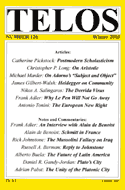As an occasional feature on TELOSscope, we highlight a past Telos article whose critical insights continue to illuminate our thinking and challenge our assumptions. Today, Juan Carlos Donado looks at Alberto Buela’s “The Katechon and the Future of Latin America,” from Telos 126 (Winter 2003).
 A recent Colombian periodical announced the news: by the end of 2011, the country’s capital, Bogotá, reported an unemployment rate, at least by official accounts, 0.3% lower than that of the United States. The headlines, mediatic as they may intend, aim at fixing in print the dynamics of a continental reality: while European and American economies struggle with unprecedented crises, at least eight Latin American economies closed the year, according to the Centre for Latin American Studies (CESLA), with above average growth.
A recent Colombian periodical announced the news: by the end of 2011, the country’s capital, Bogotá, reported an unemployment rate, at least by official accounts, 0.3% lower than that of the United States. The headlines, mediatic as they may intend, aim at fixing in print the dynamics of a continental reality: while European and American economies struggle with unprecedented crises, at least eight Latin American economies closed the year, according to the Centre for Latin American Studies (CESLA), with above average growth.
In his unapologetic “The Katechon and the Future of Latin America,” Alberto Buela examines the Greek notion of katechon as the key to understanding the possibilities of Latin America’s relation to the so-called First World. Originally meaning “to restrain,” “to prevent,” or “to hold back,” the term katechon was employed by Paul the Apostle in II Thessalonians 2:6–7, in the context of explaining two crucial events that would necessarily occur before Christ’s Second Coming. The first was the Great Apostasy or falling away of the Church; the second, the revelation of the man of sin or Antichrist, an event Paul asserts will be manifest only when the “restraining” or “holding back,” that is: the katechon, recedes.
Allowing the Antichrist to be revealed in his own time, the katechon‘s role is, at least, twofold: it is that which restrains the prospects of a coming evil but, at the same time, it is the katechon‘s withdrawl that actualizes the possibility of the eschaton or age to come.
Leaving theological disputations aside but radically picking up on its connotations of resistance, Buela appropriates the notion by giving it a political twist that draws from Carl Schmitt’s concept of Großraum. Although, historically, the interpretations of the katechon have ranged from the Third Person of the Trinity to Satan himself, Buela attempts to think the katechon as a distinct geopolitical entitity. His katechon or authentic Latin American Großraum would serve as a safeguard against the unilateral project of globalization, providing multiple possibilities at the face of the authoritarian sameness of a globalized new world order. Buela himself puts it as follows:
Taking into account the Apostle Paul’s enigma regarding the personal and the impersonal katechon, and Schmitt’s concept of Großraum (a large spacial political entity), the political change to be sought today is the construction of Großräume in general, and of a South American Großraum in particular, to function as a katechon against the “fundamentalist vision of globalization according to which this is the only possible world,” and Bush’s project of a single government dominating the world.
According to Buela, the conditions are already set for the consolidation of the Großraum that has haunted the minds of Latin Americans ever since Simón Bolívar rode on horseback through the continent’s plains: a common language, a common economic and cultural history, a common religion, a common fascination for a figure that transcends the institutions of liberal democracy: that of the leader or caudillo. What then is to be done in order to awaken such sleeping, unifying possibilities? Among others, Buela suggests, Latin America must revitalize the trading routes that were established and used by the Spaniards ever since the conquest and colonization. Interestingly enough, Buela advocates for a return to fluvial routes as a way to virtually connect the entire continent, consuming seven times less energy than road transportation and three times less than railroads.
In a way that is reminiscent of José Vasconcelos’s The Cosmic Race, Buela even elaborates on the secret symbolism that would hold such a Großraum together by means of its own set of esoteric arcana: “This space has a peculiar eschatological destiny embodied in the solar splendor of The Lady of Guadalupe. This will probably be the secret of the great political event that will occur, and this new katechon will be the Latin Americans’ America.”
If the katechon is in fact Latin America’s essential relational category or just part of another Latin Americanist utopia, is the horizon against which Buela’s thoughts will ultimately be assessed.
Read the full version of Alberto Buela’s “The Katechon and the Future of Latin America,” at the Telos Online website. If you are affiliated with an institution that is an online subscriber to Telos, you have free access to our complete online archive. If not, you can purchase 24-hour access to this and other Telos articles at a per-article rate. Follow the article link for more details.



